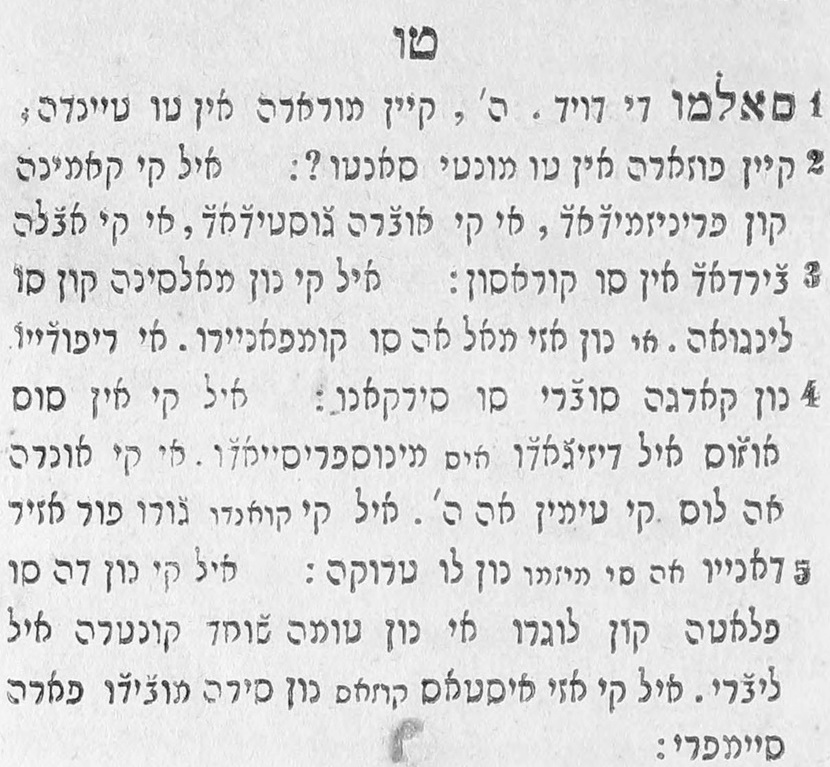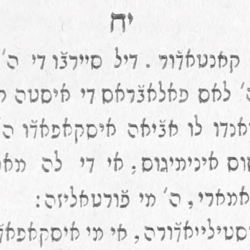| Source (Hebrew) | Translation (Ladino) | Transliteration (Romanized Ladino) |
|---|---|---|
שִׁ֗יר לַֽמַּ֫עֲל֥וֹת אֶשָּׂ֣א עֵ֭ינַי אֶל־הֶהָרִ֑ים מֵ֝אַ֗יִן יָבֹ֥א עֶזְרִֽי׃ |
קאנטאר די לאס סובﬞיאס. אלסאדי מיס אווס אה לוס מוטיס ,די אונדי בﬞידרה מי אייוה׃ |
Cantador de las sovridas. Alçadei mis ojos a los montes, a de onde veidra mi ayuda. |
עֶ֭זְרִי מֵעִ֣ם יְהֹוָ֑ה עֹ֝שֵׂ֗ה שָׁמַ֥יִם וָאָֽרֶץ׃ |
מי אייה ייני די ה׳‚ אזיור די לוס סיילוס אי די לה טיירה׃ |
Mi ayuda viene de HASHEM, hizidor de los çielos y de la tierra. |
אַל־יִתֵּ֣ן לַמּ֣וֹט רַגְלֶ֑ךָ אַל־יָ֝נ֗וּם שֹׁמְרֶֽךָ׃ |
נו דיארה קי טו פיי סי איסמוה. טו גוארדאור נו דורמי׃ |
No dexara que tu pie se a se mueva. Tu Guardador no duerme. |
הִנֵּ֣ה לֹֽא־יָ֭נוּם וְלֹ֣א יִישָׁ֑ן שׁ֝וֹמֵ֗ר יִשְׂרָאֵֽל׃ |
איק‚ נו דורמי אי נו סי אורמיסי איל גוארדאר‚ די ישראל׃ |
Y que no duerme y no se a dormirse, el Guardador de Israel. |
יְהֹוָ֥ה שֹׁמְרֶ֑ךָ יְהֹוָ֥ה צִ֝לְּךָ֗ עַל־יַ֥ד יְמִינֶֽךָ׃ |
ה׳ איס טו גוארדאר‚ ה׳ איס טו סולומברה‚ אה טו מאנו דיריה׃ |
HASHEM es tu Guardador, HASHEM es tu solombra a tu mano derecha. |
יוֹמָ֗ם הַשֶּׁ֥מֶשׁ לֹֽא־יַכֶּ֗כָּה וְיָרֵ֥חַ בַּלָּֽיְלָה׃ |
די דיאה נו טי אירירה איל סול‚ ני לה לונה די נוי׃ |
De día no te herirá el sol, ni la luna de noche. |
יְֽהֹוָ֗ה יִשְׁמׇרְךָ֥ מִכׇּל־רָ֑ע יִ֝שְׁמֹ֗ר אֶת־נַפְשֶֽׁךָ׃ |
ה׳ טי גוארדארה די טוו מאל‚ גוארדארה טו אלמה׃ |
HASHEM te guardará de todo mal; guardará tu alma. |
יְֽהֹוָ֗ה יִשְׁמׇר־צֵאתְךָ֥ וּבוֹאֶ֑ךָ מֵ֝עַתָּ֗ה וְעַד־עוֹלָֽם׃ |
ה׳ גוארדאלה טו סאליה אי טו אינטראה‚ די אגורה אי אסטה סיימפרי׃ |
HASHEM guárdala tu salida y tu entrada, y hasta siempre. |
This is a Ladino translation of Psalms from תהילים או לוס סאלמוס ; טריסלאד’אד’וס דיל לשון הקדש אין לה לינגואה ספרדית (Tehillim, or the Psalms, translated from the Holy language [Hebrew] into the Sephardic language, Estampado por Ǧ. Griffit 1852/3), p. 187. The Romanization schema for the Ladino closely follows the style of Professor Moshe Lazar z”l, of the University of Southern California (USC), who in 1988 produced the transcription of the Constantinople Codex of 1547 and provided a novel transliteration of the vocalized Ladino. This transliteration scheme for the Ladino language loses no information coming from the Hebrew letters, keeping the form of the ancient tongue while eschewing the Atatürk language reforms which are foreign the original base Spanish and Portuguese roots of the language. –Shmuel Gonzales
Source(s)


“תהלים קכ״א בלשון לאדינו | Salmo 121 | סאלמו קכא | Psalms 121 in Ladino (Estampado por Ǧ. Griffit, ca. 1852/3)” is shared through the Open Siddur Project with a Creative Commons Public Domain Dedication 1.0 Universal license.










Leave a Reply